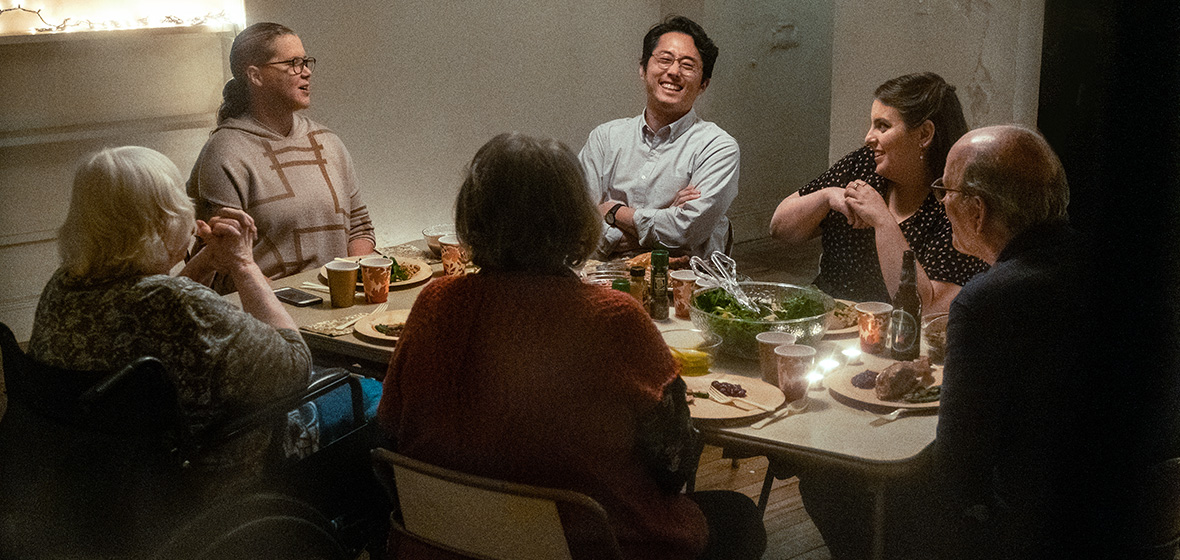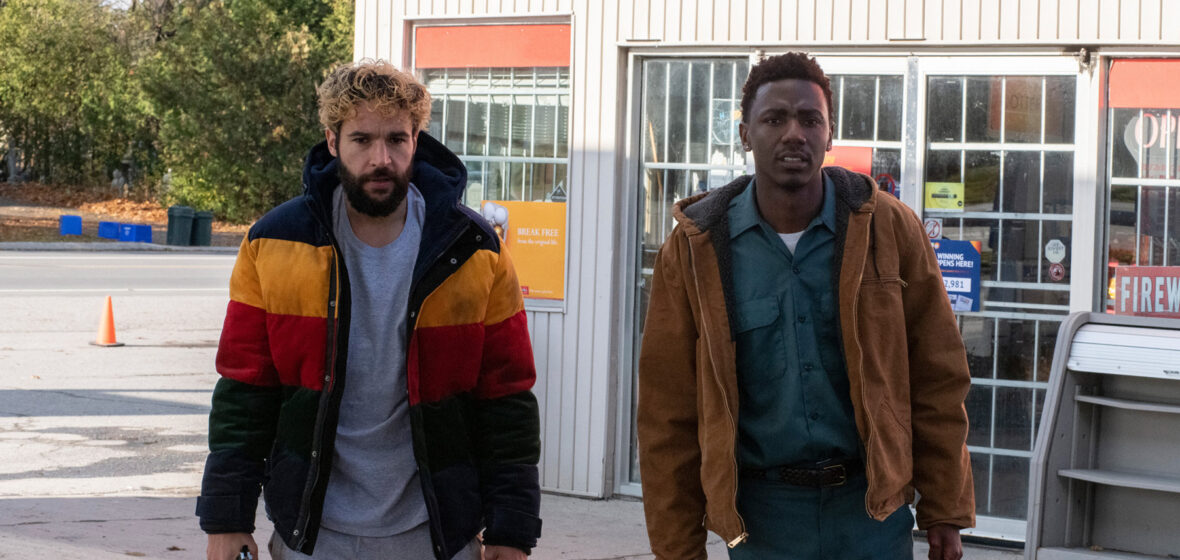On the Count of Three: 4 out 5 stars
The Humans: 4 out 5 stars
It’s known that the best comedians make the best dramatic actors. Think of Robin Williams’ and Jim Carrey’s best roles, and how liberating it felt to see them exposed in a serious role, as if comedy was a way to channel their insecurities both tangibly and entertainingly.
If you don’t know Jerrod Carmichael, he’s been a constant on the North American stand-up comedy scene for the past decade, complementing his work here with guest spots in the most famous TV shows, from Saturday Night Live to all the late-night talk shows. His The Carmichael Show tried to deconstruct the tradition of the African-American sitcom, but was probably too meta for the wider audience it was targeting. This year he released the comedy special Rothaniel, directed by Bo Burnham, another young comedian with an edge for the depressives. Here Carmichael used the performance as a conduit for all the systemic trauma he has had to deal with, from the generational pressures inherent in the African-American experience to the anxiety of being a millennial. It’s no surprise that this film, where he directs and plays the protagonist, is also the most depressing piece of American media since Bo Burnham’s Inside.
The premise of On the Count of Three is a strong one. Two friends suffering from severe depression decide to shoot each other simultaneously. In the heat of the moment, they feel they’re not yet ready to go through with the plan, and choose to take the day to resolve all the issues oppressing them and confront those responsible for their trauma.
The friends are played by Carmichael and by Christopher Abbott, whom you may remember as Marnie’s boyfriend in Girls. The film works because of their chemistry, and the two characters perfectly represent that neighbourhood connection between two people from different social statuses. We know that Kev’s (Abbott) upbringing was one rooted in privilege — he’s white, and currently in a mental health clinic; he saw a private therapist in his younger days. In contrast, Val (Carmichael) reflects the experience of an African-American. He’s had to deal with all his ghosts alone, with no community or family support.
Carmichael and his writers Ari Katcher and Ryan Welch, who worked with Carmichael on his sitcom and other projects like the tremendous HBO show Ramy, don’t try to compare the world of the two friends in a way that gives one an edge over the other. As they embark on their quest to meet up with people from their past, they feel apprehension on behalf of, and show support for, each other in equal measure. This is true brotherly love on display. But the writers also understand that there is no masking this reality, and allowing the audience to hide from the social consequences that left these young men contemplating suicide would mean condoning an escape from the responsibility to address issues like these.
The cast is inspired. Three experienced, seasoned comedians play important roles with virtually no laughs. JB Smoove (the ecstatic roommate in Curb Your Enthusiasm) is Val’s violent and absent father, Tiffany Haddish is the girlfriend who lost patience while Val was seeking help, and Henry Winkler is Kev’s child psychiatrist and molester. To each Carmichael gives a role they wouldn’t typically be considered for, and each of them nails the task of confronting deep emotional bruising
When the third act kicked in, I don’t know whether it was my deep involvement in the fate of the two men or the thunderous soundtrack by Canadian violinist Owen Pallett, but I was left overwhelmed by all the emotions at play. Carmichael is a great director who understands pace, and he also gives his actors the time and space to act their hearts out, as he does with Abbott. It’s a tremendous climax, up there as the most cathartic of the year. And it works, mainly because, when all’s said and done, Carmichael and his writers have made a film not about what’s worth living for, but about what’s worth dying for.

If On the Count of Three is about analysing our fleeting existence in this unfair world, then The Humans is not as deeply engaged in its messaging. It’s not dark, but bleak; it’s not cathartic, but contemplative. Written and directed by Stephen Karam, adapting his own play, it follows a middle-class family in New York on a Thanksgiving evening.
The Blakes are all at different stages in their lives. The father, Erik (Richard Jenkins) and the mother, Deirdre (Jayne Houdyshell) are dealing with depression, financial insecurity, and having to look after Erik’s senile mother, Momo (June Squib). The older daughter, Aimee (Amy Schumer) battles a chronic disease and the end of her relationship, while the younger daughter Brigid (Beanie Feldstein) faces the shattering of her dreams of being a music composer even with the utmost support from her partner Richard (Steven Yeun).
The film is set in Richard and Brigid’s Manhattan apartment. An old building, dejected and empty, too close to ground zero, it’s a perfect metaphor for America after 9/11. While the family prepares the dinner, each contemplates their woes in their own way, but it’s refreshing to see them open up and share their fears and feelings like functional families do. At some point, Erik admits to having haunting visions of a faceless woman following him, and suddenly the building becomes a claustrophobic, phantasmagorical setting where this is possible — not that this is a horror film. Still, it contains tensions that give it the air of Roman Polanski’s Repulsion.
What is impressive about the film is how well it treats its middle-class characters. It’s not often that we see an American film written by someone who empathises with the social status of characters like these and represents perfectly the ennui of a class that seems to have been forgotten. The Blakes are not a family with a white picket fence home and new designer clothes. Their situation is grounded in reality, pure unadulterated reality, and possibly the most shocking emotional punch thrown by the film is the realisation that its bleakness is built on the truth.
The Blakes are Americans and, by extension, all of us. The spectre of 9/11 looms over them as the moment everything changed for the west, and while the younger generation still clings to the hope that things will turn for the better soon, it’s the older ones who face the reality that their fading curtain will go down not with grace and poise, but with an empty thump.
Impressively, in his first feature Karam does precisely what’s asked of a playwriter turned filmmaker. He takes the opportunity to frame the shots with walls in a nod to the original staging, but when it fits he also takes the visuals where the constraints of the theatre won’t let him. For example, a long and oppressive shot down a narrow corridor can only work in a medium that allows the audience to see through the point of view of the characters, while later, an exquisitely framed shot of the family listening to Brigid’s score seems to highlight the moment a new filmmaker is born.
The only thing missing in The Humans is a sense of purpose beyond the respect given the characters by the filmmaker. The world is bleak, yes, the filmmaker makes that point convincingly; but not everyone in the family shares that position, and by not giving some of the characters time to develop, it almost seems Karam is purposely presenting a narrow worldview.
He does wrap it all up with a powerhouse of an ending, however. That ending takes away the audience’s breath, especially for those viewers who haven’t been concentrating. I’m not sure if this ending distracts from the thematic focus of the story up to this point, but it did leave the audience in silence for the entire duration of the credits.
With On the Count of Three and The Humans, both Carmichael and Karam having thrown their names into the ring for best upcoming filmmakers.




